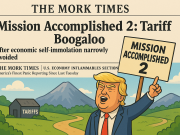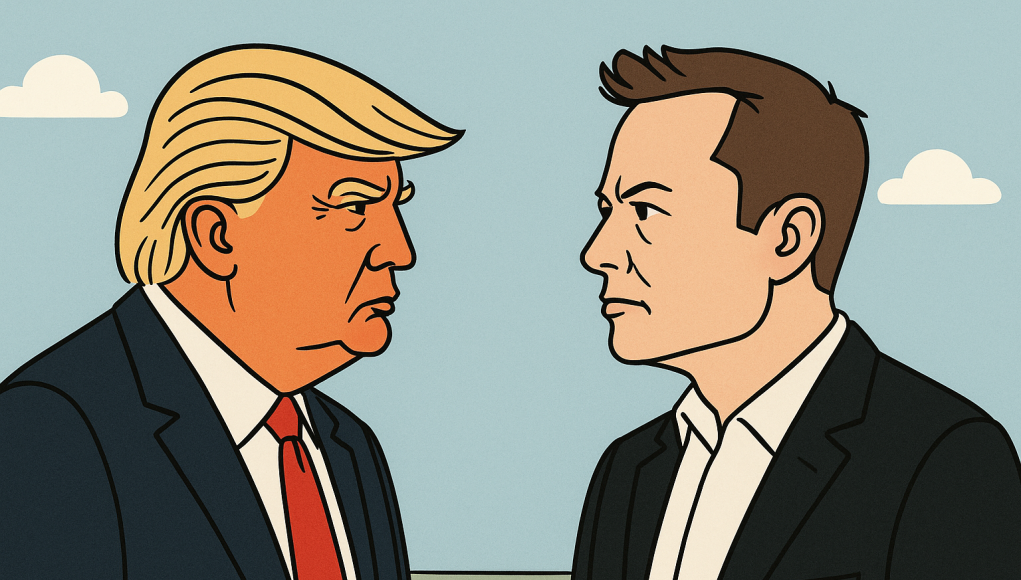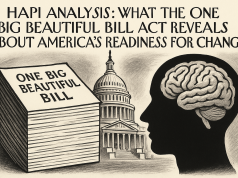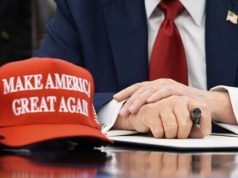Sometimes it’s hard to see the core strategy within the media noise. Headlines come varnished with opinion, and narratives often bend to audience biases. That’s why it’s refreshing—and occasionally fun—to step back and run the same data through a different lens. The Human-AI Partnership Index (HAPI) offers just that: a clear, structured way to assess who’s leading, adapting, and building toward a better future. In the case of the Elon Musk-Trump fallout, the HAPI lens gave a surprisingly sharp picture. So I’m sharing it—not for the drama, but for the insight.
In nature, when two apex predators clash, the ecosystem doesn’t just watch—it trembles. The lion and the bear don’t just fight for territory; their confrontation reshapes the behavior of every species around them. The same can be said of the very public feud now unfolding between Elon Musk and Donald Trump—two towering forces in American innovation and populist power, respectively.
But while the media has rightly devoured the clickbait, a more important question remains largely unanswered: What does this battle mean for our future with AI?
To answer that, we turn to the Human-AI Partnership Index (HAPI)—a multidimensional framework that goes beyond leadership charisma or popularity, measuring whether someone is helping or hindering the rise of systems that empower human potential through AI.
Let’s examine Musk and Trump across five domains of HAPI: Cognitive Growth, Emotional Well-being, Social Synergy, Ethical Maturity, and Communication Clarity.
🧠 1. Cognitive Growth: Who’s Thinking Beyond the Moment?
Much like chess grandmasters who plan ten moves ahead, leaders of complex ecosystems need to anticipate, adapt, and recalibrate in real time.
- Elon Musk (7.1/10)
Musk’s departure from Trump’s Department of Government Efficiency (DOGE) is not just drama—it’s divergence. By distancing himself from what he called “legislative slush,” Musk signals a return to first principles: merit, independence, and distributed innovation. AI systems—like Musk—thrive on adaptive learning loops. In fact, Musk behaves like an open-source model tweaking its own weights mid-flight. - Donald Trump (5.6/10)
Trump, by contrast, continues his pattern of centralizing loyalty and punishing deviation. His governance style treats feedback as threat rather than fuel. In a world of AI-enhanced systems, such rigidity is costly. He’s using last season’s playbook in a new-league game.
💓 2. Emotional Well-being: Who’s Calming the System?
In AI-human ecosystems, emotional trust is the invisible thread. Without it, stress corrodes innovation and systems fracture.
- Elon Musk (5.9/10)
Musk’s style—provocative tweets, Epstein name-drops, and public threats to decommission Dragon spacecraft—has emotional consequences. While it energizes segments of his audience, it injects volatility into already high-pressure environments. Trust in leadership isn’t just a soft metric; it’s core infrastructure in emotional well-being. And this is a code Musk sometimes corrupts. - Donald Trump (6.3/10)
Trump’s brand is emotional chaos, but it’s predictably chaotic. His audience is desensitized to the bluster. Ironically, this makes him slightly more stable in emotional impact—though stability in dysfunction is a dubious virtue.
Winner: Trump, narrowly—and only on consistency, not constructive leadership.
🌱 3. Social Synergy: Who’s Strengthening the Web?
Imagine a beehive. Its strength isn’t the queen or the drones—it’s the cohesion. Similarly, social synergy measures whether a leader is building or breaking the collective network.
- Elon Musk (6.0/10)
Musk’s exit from Trump’s orbit severs a high-visibility alliance, but positions him closer to global, decentralized innovation efforts. He’s lost one hive, but may be joining a smarter swarm. His ability to realign quickly softens the blow. - Donald Trump (5.4/10)
Trump’s zero-sum loyalty politics weakens not just his tech alliances, but also public-private collaborations more broadly. His behavior discourages innovation leaders from public alignment, shrinking his influence and jeopardizing AI-informed policymaking.
Winner: Musk—he loses a bridge, but keeps his compass.
🧬 4. Ethical Maturity: Who’s Using Power Wisely?
Ethical maturity in the AI age isn’t about being spotless—it’s about transparency, stewardship, and commitment to systems bigger than oneself.
- Elon Musk (6.4/10)
Musk is ethically complex. He challenges opaque power structures, promotes open-source initiatives, and fiercely debates tech ethics. Yet his weaponization of scandals crosses into ethically hazardous terrain. He’s not unethical—but he sometimes treats ethics like an engineering problem: solvable with shock and awe. - Donald Trump (5.2/10)
Trump’s use of power remains deeply transactional. Whether it’s threatening audits or loyalty tests, he uses the state as cudgel, not compass. In AI contexts—where trust in leadership is algorithmically reflected—this is particularly damaging.
Winner: Musk—ethically messy, but directionally sound.
📡 5. Communication Clarity: Who’s Telling a Coherent Story?
AI learns from the stories we feed it. Clarity isn’t a courtesy—it’s a code.
- Elon Musk (6.0/10)
Musk communicates like a jazz musician. Some riffs are brilliant, others erratic—but beneath the improvisation is a recognizable theme: autonomy, innovation, curiosity. He may cause confusion, but he also sparks inquiry. - Donald Trump (5.3/10)
Trump speaks in predictable loops—effective for rallies, less so for dialogue. His communication doesn’t build ecosystems; it builds arenas. And arenas don’t scale into networks.
Winner: Musk—unfiltered but multidimensional.
🧾 Final Scorecard
| HAPI Domain | Elon Musk | Donald Trump |
|---|---|---|
| Cognitive Growth | 7.1 | 5.6 |
| Emotional Well-being | 5.9 | 6.3 |
| Social Synergy | 6.0 | 5.4 |
| Ethical Maturity | 6.4 | 5.2 |
| Communication Clarity | 6.0 | 5.3 |
| Total HAPI Score | 6.3 | 5.6 |
🧭 Conclusion: Musk Wins the Long Game—If He Plays It
In this leadership laboratory of egos and ideologies, Elon Musk emerges as the more analytically adaptive and systemically relevant player. His actions reflect a commitment to learning, recalibration, and ethical debate—even if messily executed. Trump’s approach, while emotionally galvanizing, seems increasingly out of sync with the demands of AI-integrated futures that prioritize feedback, flexibility, and network trust.
As we build ecosystems where AI doesn’t just mimic intelligence but amplifies humanity, we need leaders who understand that progress isn’t made by fighting the future—but by partnering with it.
In that regard, Musk may have left Trump’s stage—but he’s still in the game. And perhaps, he’s just rebooted the mission.
Read more….What is HAPI?
Read more…..HAPI Analysis of Big Beautiful Bill Act
For Tips and Suggestions Contact




























